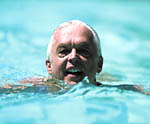 |  |
by Pamela Weintraub Evan W. Kligman, M.D., geriatrician and family physician in Tucson, Ariz., and head of the Optimal Aging Program at Canyon Ranch Health Resort says, "In a sense, the new field of longevity medicine is really utilizing the best, most advanced form of preventive medicine possible. Most of medical science deals reactively with disease after it happens, and uses technology that is terrific at keeping you alive once you get sick. Our approach is to work with people early, to assess their lifestyle and behavioral risk factors and recommend tests designed to identify problems before that patient is aware they exist. Cardiovascular disease is the No. 1 killer in the United States, for instance, and risk factors start as early as age 10. If you look at centenarians, you realize the reason they made it to age 100 was because they did not succumb to the age-related diseases. If we could predict and delay those diseases one by one, we'd have a better chance of living to 100 in a healthy, active state. Our goal is prevention or delay of the degenerative diseases of aging by working with people from young adulthood onward." "Through my work in geriatrics," Kligman states, "I have followed the health trajectories of hundreds of people in their 80s and 90s. I began to appreciate that there are distinct differences between how people act, behave and feel when they get to extreme old age, primarily based upon what kind of lifestyle decisions they made when they were much younger. I realized I had to use what I learned from my 90-year-old patients with my 40-year-old patients, and that's when I started to work at Canyon Ranch." In fact, optimizing the aging process may do more than enhance health, fitness and other qualities of youth, it may actually mean the difference between living to 85 or making it to age 100. Most traditional physical exams include a series of blood- and urine-based lab tests that measure 10 to 20 factors, explains Kligman, "but the new research has found that deficits in many areas not covered by the traditional tests actually hasten the process of age." One critical factor, for instance, is elevated levels of the amino acid homocysteine, associated with coronary artery disease as well as premature aging. Another is oxidative stress, the damage caused when the ordinary process of metabolism generates highly reactive and destructive oxygen molecules called free radicals. Also an issue: environmental toxins and pollutants from the air, office vents or acid in rain. At first, patients undergo analysis to find "markers" indicating deficits and associated acceleration in the aging rate. After identifying longevity risk factors - and most everyone has at least one or two - the goal in age management is shoring up weak links. In the end, says Kligman, the culprits of aging are things we always knew were bad. "Smokers produce large amounts of free radicals, and age rapidly," he says. "Stress increases the free radical load, and so does the ultraviolet radiation of the Sun." "This doesn't have to be rocket science," he adds. Meditation, challenging work to exercise the brain and eight glasses of water a day help, as well.
For Free Information on Our Advertisers Click Here.
| |||||||||||||||||||||||||||||||||||||||||||
 We have always tried to beat back death, or at least outsmart it.
Whether the strategy is a Ponce de León-like search for the fountain of
youth or a stockade of "anti-aging nostrums" from health-food store
shelves, our quest for longer, healthier lives is as old as the human
species itself. Though the effort has seemed futile in the past,
findings from the cutting edge of medicine indicate we can, at the dawn
of the 21st century, do much to optimize how we age. Indeed, in the
past couple of years, a group of experts specializing in a new field
called age management are offering a new, anticipatory form of
medicine, in which the aging process is literally optimized from the
moment it begins - sometime after puberty, in the early 20s -
throughout life. The arsenal of anti-aging strategies maintain the body
and mind, say practitioners, in the process literally slowing the
measurable rate at which patients age.
We have always tried to beat back death, or at least outsmart it.
Whether the strategy is a Ponce de León-like search for the fountain of
youth or a stockade of "anti-aging nostrums" from health-food store
shelves, our quest for longer, healthier lives is as old as the human
species itself. Though the effort has seemed futile in the past,
findings from the cutting edge of medicine indicate we can, at the dawn
of the 21st century, do much to optimize how we age. Indeed, in the
past couple of years, a group of experts specializing in a new field
called age management are offering a new, anticipatory form of
medicine, in which the aging process is literally optimized from the
moment it begins - sometime after puberty, in the early 20s -
throughout life. The arsenal of anti-aging strategies maintain the body
and mind, say practitioners, in the process literally slowing the
measurable rate at which patients age.